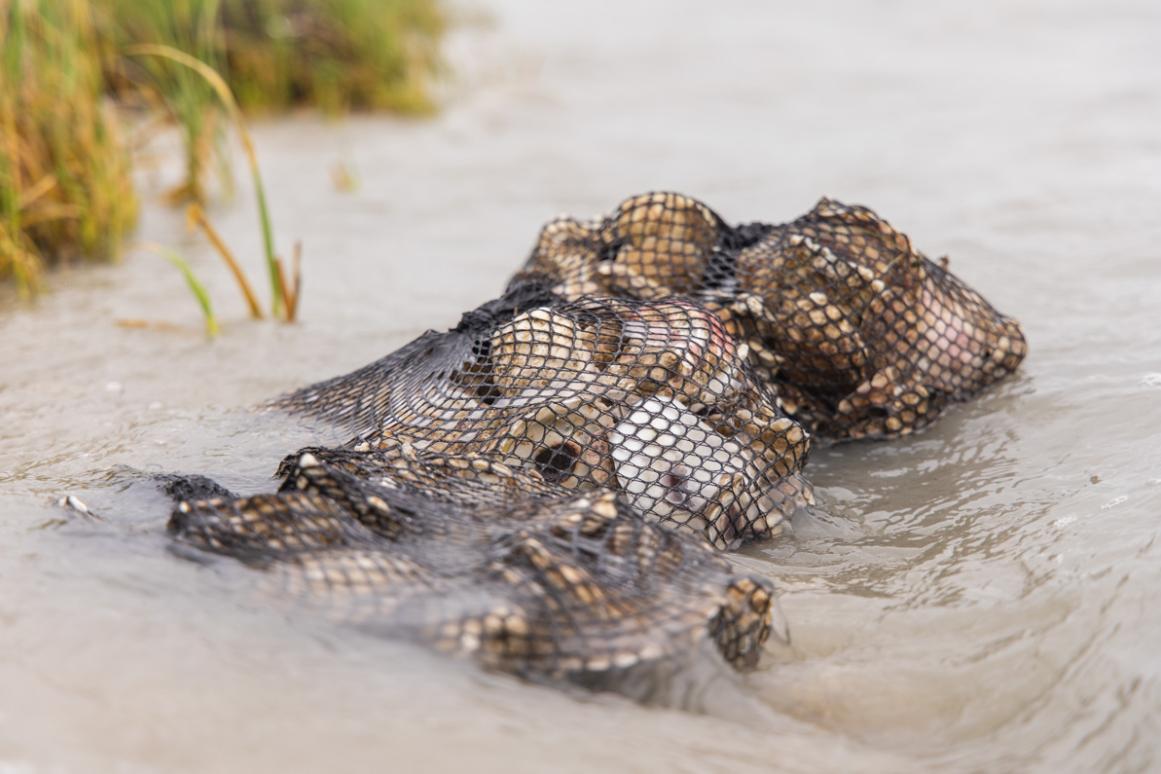Innovative Plastic-free Solutions for Oyster Reef Restoration: HRI Involved in Collaborative Project That Takes on Marine Debris in Gulf of Mexico

Transformative oyster reef projects such as Sink Your Shucks™ have significantly contributed to the restoration and conservation of vital ecosystems in the Gulf of Mexico and beyond.
As those projects evolve and expand, scientists and researchers are working to find ways to better understand what type of materials can work best to build reefs using sustainable materials and practices while also tackling the issue of marine debris.
A collaborative research project focusing on reducing the use of plastic in oyster reef restoration led by the Harte Research Institute for Gulf of Mexico Studies (HRI) at Texas A&M University-Corpus Christi is working on that, while also engaging with local communities about marine debris and microplastics.
The project “Plastic-free restored habitats: Reducing nano-, micro- and macro-plastic pollution in community-based restoration of coastal shorelines and oyster reefs” has begun after receiving $2,714,917 million in funding through the National Oceanic and Atmospheric Administration (NOAA) Sea Grant Marine Debris Challenge Competition. The project will assess the effectiveness of plastic-free materials as an alternative to the traditionally used (polyethylene) plastic mesh in pilot oyster reef restoration experiments in Texas and Florida.
Multiple entities are involved in the three-year project including HRI, the University of Central Florida, the University of Texas Marine Science Institute and Texas Sea Grant. The project is led by Dr. Jennifer Pollack, the Larry D. McKinney Endowed Chair for Coastal Conservation and Restoration at HRI, and Dr. Linda Walters, Pegasus Professor of Biology at University of Central Florida’s Coastal and Estuarine Ecology Lab. HRI’s Director of Community Engagement Jace Tunnell is also one of the principal investigators on the project.
The Sea Grant Marine Debris Challenge Competition and the Community Action Coalitions were competitions focused on preventing and removing marine debris in coastal and Great Lakes communities. They received a combined $27 million in funding from the Department of Commerce under the Bipartisan Infrastructure Law (BIL) using NOAA Sea Grant’s partnered approach with the goal being to bring science and communities together for workable solutions.
The funding is part of nearly $3 billion in targeted investments by NOAA for habitat restoration, coastal resilience and weather forecasting infrastructure through BIL.
The Marine Debris Challenge Competition was created to push the boundaries of existing marine debris prevention and removal technologies and approaches and turn innovative research into tangible results.
The project focuses on addressing environmental problems caused by plastics in coastal habitat restoration and finding science-based approaches to solve the issue. The sites for the project will be in St. Charles Bay in the Mission-Aransas Estuary on the Gulf Coast of Texas near Rockport and Mosquito Lagoon on the East Coast of Florida in the Indian River Lagoon system.
The project aims to assess the effectiveness of plastic-free alternatives to restore intertidal oyster reefs in coastal environments. It also seeks to quantify any unintended consequences of using polyethylene plastic compared to non-plastic materials in restoration efforts.
A key component of the three-year project involves inclusive planning and engagement, ensuring the active participation of underrepresented groups and stakeholders to drive transformational change in environmental restoration practices.
Engagement will target underserved schools, community centers, special-needs adults, and other organizations affected by marine debris, and include educational materials in English and Spanish along with hands-on training. The project will work with multiple partners to engage students in STEM programs, residents of South Texas’ colonias and special needs adults in Florida.
Additional goals will be to involve students and citizens in oyster reef restoration projects, and to distribute restoration materials across the Gulf of Mexico to stimulate a large-scale shift away from using plastic materials in restoration efforts.
